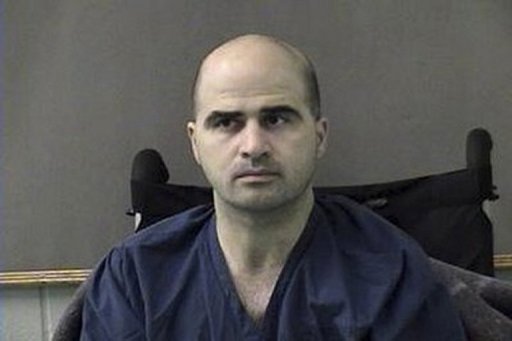Survivors of the Fort Hood massacre face being questioned this week by the US Army psychiatrist accused of committing the attack, the deadliest such incident on an American military base.
Major Nidal Malik Hasan, who has previously admitted killing 13 people and wounding dozens more at the Texas facility in 2009, goes on trial Tuesday. Having sacked his lawyers, he will represent himself.
Kimberly Munley, a former Fort Hood police officer wounded in the shooting, which shocked the military and sparked calls for greater protection from “homegrown” terror, said she was dreading the prospect of being cross-examined.
Hasan, the 42-year-old US-born son of Palestinian parents, was preparing to deploy to Afghanistan prior to the attack, and he has said he attacked fellow soldiers to protect his fellow Muslims from an “illegal” war.
The government’s lead witness said he would not lash out at Hasan despite feelings of rage about a man who is accused of shooting him five times.
Military judge Colonel Tara Osborn has insisted that the long-awaited trial focuses on the facts of the shooting. She has barred prosecutors from mentioning terrorism as a motive and prohibited Hasan from using a “defense of others” strategy to justify his actions.
However, Hasan’s former civilian defense lawyer John Galligan said Osborn was wrong to rule that the defense of others strategy has no legal merit.
The ruling largely ended Hasan’s ability to use the trial to espouse his extremist views, but legal experts believe he will still attempt to do so.
A former head of military prosecutions at Fort Hood said Hasan’s conviction seems a foregone conclusion.
In documents Hasan recently released to AFP, he stated that his role as a military psychiatrist working to build morale among fellow soldiers made him complicit with a government openly opposed to the “law of Almighty Allah” becoming “the supreme law of the land.”
The six-page transcript of Hasan’s conversation with an Al Jazeera reporter was recorded from his jail cell, transcribed by the FBI and later entered into evidence against him.
Hasan, born in Virginia, joined the Army in 1995, entered military medical school in 1997 and did his residency at Walter Reed Army Medical Center from 2003 to 2006.
It was there that his first outward signs of radical Islamic views developed, according to an FBI report titled “A Ticking Time Bomb.”
Hasan attended a mosque where radical US-born cleric Anwar al-Awlaki — a key figure in Al-Qaeda in the Arabian Peninsula who was killed in a 2011 drone strike in Yemen — worked in 2001.
He exchanged emails with Awlaki in the months leading up to the shooting in which he questioned the morality of killing soldiers if they intended to attack Muslims. Awlaki later called Hasan a hero.
Osborn estimates the trial could last anywhere between one and four months. More than 250 witnesses are set to testify against Hasan, including family members of each of the 13 killed in the shooting and the 32 soldiers and civilians who were wounded.

COMMENTS
Please let us know if you're having issues with commenting.